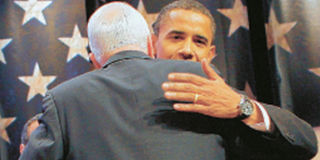Race card could hurt Obama’s dream

US presidential candidates Barack Obama (back) and John McCain embrace when they appeared together at a forum on national service at Columbia University on Thursday. Photo/REUTERS
No-one can specify the degree to which racial bigotry will affect the outcome of the November 4 US presidential election. But some analysts suggest it could prove decisive in denying victory to Sen Barack Obama.
As one indicator of the progress towards racial justice that has occurred in the US in recent decades, few whites now say explicitly that they refuse to vote for an African-American because of his skin colour. Almost 20 per cent of the white respondents to a poll last month did say, however, that they know people who hold that prejudice.
Republican Party leaders, including presidential nominee John McCain and his running mate, Governor Sarah Palin, are making no overt appeals to white racism. Sen McCain has in fact declared that race should play no part in the campaign.
But the Republican Party does remain overwhelmingly white. African-Americans accounted for only 2 per cent of the 2,380 delegates attending the party convention earlier this month. By contrast, about 20 per cent of the delegates to the Democratic party convention were black.
African-Americans make up about 13 per cent of the US population.
Despite Sen McCain’s disclaimers, some Democrats charge that Republicans are sending subtly coded signals intended to call negative attention to Obama’s skin colour.
The African-American governor of New York State argued last week, for example, that Ms Palin’s Republican convention attack on Obama’s experience as a community organiser had racial implications. “There are overtones of potential racial coding in this campaign,” said governor David Paterson. “I think the Republican Party is too smart to call Barack Obama ‘black’... but you can take something about his life... a community organiser. They kept saying it, they kept laughing.”
Paterson observed that such language is “designed to inhibit other people’s progress with a subtle reference to their race.”
Republican officials deny that Palin’s remarks had any such meaning, arguing that her aim was to criticise Obama’s lack of executive experience.
Racially charged remarks by one Republican official have been far from subtle. Congressman Lynn Westmoreland, who represents a district in the Deep South state of Georgia, told a reporter last week that Obama is behaving in an “uppity” manner. The term has long been used to disparage African-Americans who challenge racist attitudes.
The virulence of race hatred on the part of at least some white Americans was dramatised by the arrest during the Democratic convention of three white men who, police said, had made threatening comments about Obama.
One of them, Nathan Johnson, subsequently told a Denver television station that “blacks don’t belong in political office. He (Obama) ought to be shot.”
A few Democrats are voicing fears about racist sentiments among some of their own party’s white working-class supporters.
Richard Trumka, a leader of the US trade union confederation, told a side-meeting in Denver during the convention that he knows white union members who are “scared to death” of Obama. “They want change. They need change,” Mr Trumka said. “But they just can’t get past the notion that voting for a black man named Barack Obama is the only way to do that.”
An unknown but perhaps sizeable number of white Americans harbour racist views but refrain from stating them publicly.
One indicator of this concealed prejudice was recalled recently by Dee Dee Myers, a White House official during the Clinton years. She had worked for Los Angeles mayor Tom Bradley, an African-American, when he ran for a seat in the US Senate in the 1980s. Polls found Mr Bradley to be leading comfortably just days prior to the election — which, to the astonishment of many observers, he ended up losing.
“I lived through that,” Ms Myers said at a forum in Denver during the Democratic convention. “We’re whistling past the graveyard if we think that race was not a factor in the Democratic primaries. Today’s young voters will get us past these attitudes,” she added, but it will take time.
Many older voters “talk about having ‘culture’ problems” with Obama. “But to separate culture from race is impossible,” Ms Myers said.
Some political analysts who favour Obama’s candidacy are, meanwhile, suggesting that racism qualifies as the key factor that could cost him the election.
Given the current unpopularity of the Republican Party, only “crazy irrationality over race” can prevent Mr Obama from winning in November,” wrote commentator Jacob Weisberg in a recent edition of Newsweek magazine. “To the rest of the world, a rejection of the promise he represents wouldn’t just be an odd choice by the United States. It would be taken for what it would be: sign and symptom of a nation’s historical decline.”
Obama himself has warned that race will be used against him. “They’re going to try to make you afraid,” he said at a rally in Florida in June. “They’re going to try to make you afraid of me – ‘He’s young and inexperienced and he’s got a funny name. And did I mention he’s black?’”




